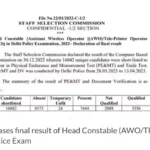In a recent development, Australian opener Usman Khawaja has been reprimanded by the International Cricket Council (ICC) for ‘displaying a personal message’ during the Test match against Pakistan at Perth’s Optus Stadium. This act took place as Australia secured a dominant victory by 360 runs in the series’ opening Test.
Khawaja, known for his batting prowess, faced charges for wearing a black armband, considered a form of protest. The ICC spokesperson stated, “Usman displayed a personal message (armband) without seeking prior approval, a breach under the category of an ‘other breach,’ with the sanction for a first offense being a reprimand.”
This incident follows Khawaja’s earlier display of slogans on his footwear, leading to a caution from the ICC. The rules strictly prohibit players from conveying personal messages on their clothing or equipment without prior approval.
In defiance, Khawaja had previously criticized the ICC for censoring him, expressing his commitment to advocating messages of support for civilians in Gaza. The ICC responded by charging him for breaching the Clothing and Equipment Regulations.
The rules explicitly state that players and team officials cannot wear, display, or convey personal messages unless approved in advance, with a prohibition on messages related to political, religious, or racial activities or causes.
Khawaja, aged 36, is expected to feature in Australia’s next meeting against Pakistan, with the second Test scheduled to begin on Tuesday.
Did you know? In the past, the ICC has imposed sanctions for similar actions, as seen in the case of England all-rounder Moeen Ali in 2014. Ali was banned for wearing wristbands with slogans “Save Gaza” and “Free Palestine.”







